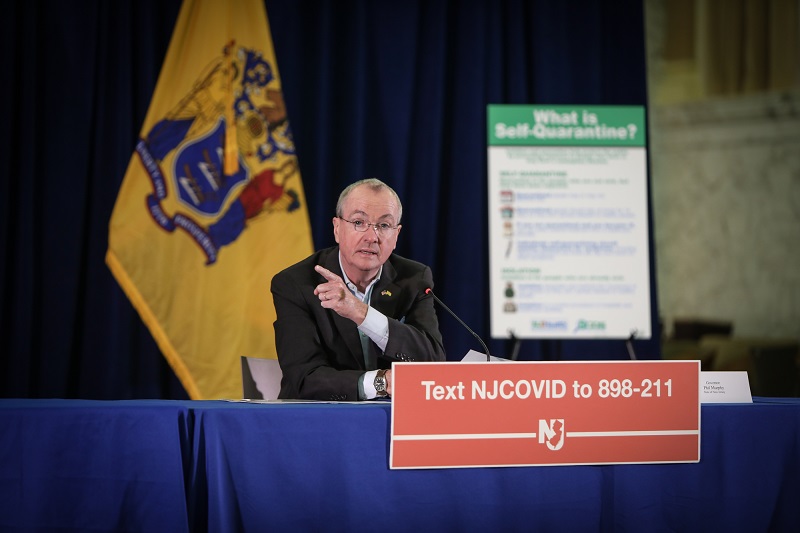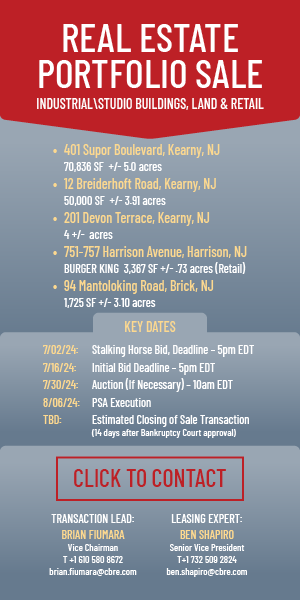By Joshua Burd
As the real estate industry prepares for life in the wake of COVID-19, the new normal — at least in the near term — will include the likes of virtual planning and zoning board hearings.
New Jersey developers and their teams are now preparing to navigate this new landscape.
Land use professionals say many municipalities, after canceling meetings in March and April, have taken steps to conduct land use business remotely. Some have hosted or scheduled hearings using Zoom, GoToMeeting and other platforms, while allowing applicants to submit plans electronically and providing a way for residents to view them online or pick up copies at a secure location.

“All of us were in unknown territory,” said Chris Roche, an engineer and principal with Langan. “And now that we’ve realized this may not be a one-month stint, I think those municipalities that didn’t have the technology are working very quickly to make sure they have it in place so that they’re not losing several months.”
Still, stakeholders on both sides are expecting little to no action on large projects in the months ahead. Both land use experts and local officials are likely to focus on smaller, mundane business in order to help prevent a backlog, while putting off high-profile applications and other matters that are considered more ambitious or controversial.
That’s likely to be the case even though, as of mid-April, boards were still subject to the same deadlines for reviewing applications and scheduling hearings.

“We are seeing many applicants choose to carry their applications for the time being until such time that they can present at an in-person meeting rather than take any risk proceeding with a virtual hearing,” said Steven Mlenak, a partner with Greenbaum, Rowe, Smith & Davis LLP, who focuses on land use and redevelopment. “The risk is exacerbated by the fact that any challenge brought would be a jurisdictional one which can be brought at any time and is not subject to the 45-day statute of limitations.
“There are also concerns by some applicants that there will be a difficulty with construction financing on the assumption that it would be hard to obtain a satisfactory zoning opinion letter.”
For a state that is known for lengthy, complex land use proceedings, the coronavirus crisis has added yet another wrinkle for both developers and municipalities. Towns and cities across New Jersey shelved meetings in late March and April as the crisis escalated and as Gov. Phil Murphy banned large gatherings, ordering residents to stay at home and practice social distancing.

The governor on March 20 signed legislation allowing public bodies to hold meetings and give notice electronically in order to pay bills, enact protocols and conduct other business related to the emergency period. On April 8, the Department of Community Affairs shed additional light on how to ensure that land use business continues while still allowing residents to review and comment on applications. Videoconferencing platforms such as Zoom will be central to that process, experts say, while municipalities are still required to make both hard and electronic copies available to the public.

“There are boards that are doing this and doing it successfully,” said Jennifer Mazawey, a partner and land use attorney with Genova Burns LLC. “It’s going to vary from municipality to municipality, for sure, and as of right now, the law is that they’re supposed to be moving forward as though they’re open.”
And while other towns and their professionals may be slower to embrace the technology they need, stakeholders say there is a clear economic incentive in a time when state and municipal coffers are being ravaged.
“Local governments and state governments have got to have a desire to get normalcy restored as quickly as humanly possible because of the need for continued employment, continued taxation and just normalcy itself,” said Robert Goldsmith, who co-chairs Greenbaum’s redevelopment and land use practice. “So I would think that governments are going to be looking to restore that order as quickly as possible to keep investments going forward.”

It remains to be seen if developers and lenders will be comfortable moving ahead with larger projects in the months ahead. For one thing, the pandemic has raised fears of an economic downturn that could have long-lasting impacts on certain asset classes. As an example, Mlenak noted that a developer may be concerned that too many people have lost their jobs to support a new luxury apartment project in a particular town or region.
“I think once they figure out a way to continue operating, they’re going to,” Mlenak said of municipal land use boards. “I think the impact is really going to be on the developer side and whether the financing is going to be impacted because they’re not being able to be underwritten, given the concerns.”
Roche, who has interacted with roughly 20 municipalities in recent weeks, said that, “collectively, most … have been nothing but helpful.” Both local officials and developers feel equipped to proceed with land use matters — “with the caveat that it depends on the magnitude of the project.”
For instance, most have been willing to proceed with smaller items such as modifications to previously approved site plan applications.
“Most of our clients are very comfortable doing that in a virtual setting,” said Roche, who is based in Langan’s Lawrenceville office. “(With) some of our really large projects and potential projects, where there could be significant public input, our developer clients want to be viewed as partnering with New Jersey communities, so in some cases would prefer waiting a bit longer to have actual public meetings.”
Municipalities for now are sharing a similar experience.

“I think there’s been, in a lot of circumstances, common ground between the board and the applicant that, (if) this is a complicated application, let’s pause it and see where we’re at for the next meeting,” said Mike Cerra, assistant executive director of the New Jersey State League of Municipalities. “So I think a lot of things that might be intricate and complex have been paused for the short term. Other applications that are routine or straightforward are probably going to proceed. Some complex ones may have to proceed if the applicant insists on it.
“So the playbook is being written as we go along right now.”
Insiders also point to the threat of litigation, which has always loomed over land use matters and now looms even larger. Despite the framework in place for land use boards to hold meetings virtually, Mlenak said “everyone is learning together how best to run the meetings, present evidence and exhibits and entertain public comment (and) cross-examination of witnesses.”
And without additional legislation, he said it was uncertain how courts will interpret the DCA guidance documents issued in early April if someone were to challenge an approval on the grounds of due process.
Complicating matters is that, as of mid-April, land use boards were still subject to the same deadlines for acting on applications, although state lawmakers have proposed a means of relaxing those timeframes. A bill sponsored by state Senate President Steve Sweeney, introduced April 8, would extend certain timeframes by which planning and zoning boards have to grant or deny any applications under the Municipal Land Use Law.
The proposal is contained within legislation to extend certain state, regional, county and local agency permit approvals that would have lapsed as a result of the COVID-19 emergency. The Assembly has introduced a similar measure, building on the Permit Extension Act of 2008 that provided a much-needed grace period for projects that were stalled by the Great Recession.
In the meantime, Mazawey said she expects developers to be flexible with municipalities, within reason, especially given that courts would likely show the same flexibility.
“I think that reasonable extensions are just that — they’re reasonable and they’re going to be looked upon by a court as reasonable as well,” she said.
Stakeholders on both sides are preaching cooperation.
“There may be some outliers where it becomes confrontational, but I think in the main, towns and the applicants are going to continue to work as well as they’ve always worked,” said Cerra, who will take over in July as the League of Municipalities’ executive director. “At the end of the day, the objective is the same as it was three months ago, but how we get there has had a wrench thrown into it.”










